Review: JMS's first DC work pits Two-Face vs. Cyborg in "Teen Titans Spotlight" #13 (1987)
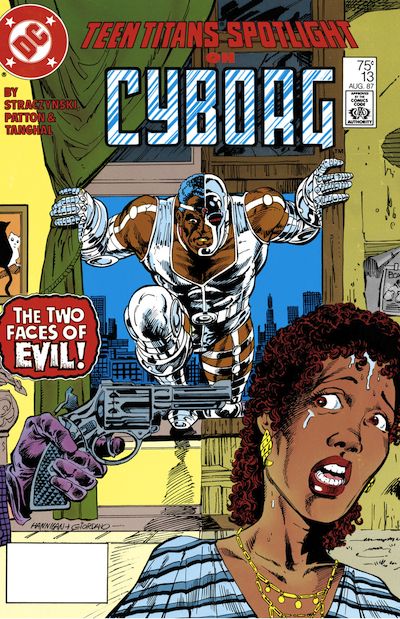
This lost gem of a story is notable not just for being one of the very best takes on Two-Face's insecurity over his appearance, nor for being an unlikely, inspired pairing of hero and villain, but it also happens to be the very first DC Comics story written by J. Michael Straczynski. Of course, this doesn't necessarily mean that the story is good. There are few writers in comics whose output can wildly fluctuate like JMS.
He's written some absolutely fantastic, must-read books like Marvel titles such as Supreme Power, The Twelve, and Silver Surfer: Requiem, plus an often-great but fatally flawed run of The Amazing Spider-Man. On the other hand, we have his current output, where he's writing incredibly wrong-headed tripe like Superman: Earth One (read seriousfic's excellent review here) and Before Watchmen. He also has a bad habit of just getting bored and ditching a title halfway through, unfinished, which he's done with Action Comics, Wonder Woman, Thor, Squadron Supreme, and The Brave and the Bold. Before all that, though, JMS made his name with his most famous work: the brilliant (though kinda forgotten?) sci-fi masterwork Babylon 5, which he created after about a decade as a animation writer of He-Man, She-Ra, and the surprisingly-excellent The Real Ghostbusters animated series.
And yet, regardless of his incredibly varied output, his very first work for DC Comics--Teen Titans Spotlight #13 remains obscure, nearly forgotten, and has never been reprinted nor talked about even in a "Hey, look at this early work that this guy did before he was a big deal! Neat, huh?" capacity. This is a real shame because it also happens to be one of my favorite Two-Face stories of all time, one which pits him against a most unlikely opponent: Vic Stone, AKA Cyborg from the Teen Titans. With this novel pairing, JMS pulls a Killing Joke scenario that serves as a great character study for both Harvey and Vic.
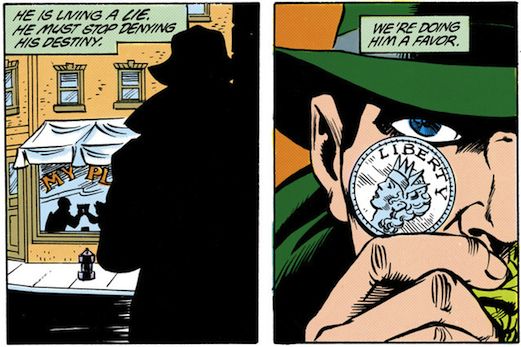
The story opens with Vic Stone--the Teen Titan known as Cyborg--being hailed by the Gotham City Humanitarian Society for his help in combating a fire at a children's hospital. That's just one step below "saving a busload of orphans and puppies" on the hero scale. As he's presented with a plaque of appreciation--notably inscribed to "Victor Stone" rather than "Cyborg," much to Vic's immense satisfaction--he quietly revels in the respect and adoration of the public as the ceremony is broadcast on live TV. That's the problem with being on TV in Gotham: you never know just who might be watching you.
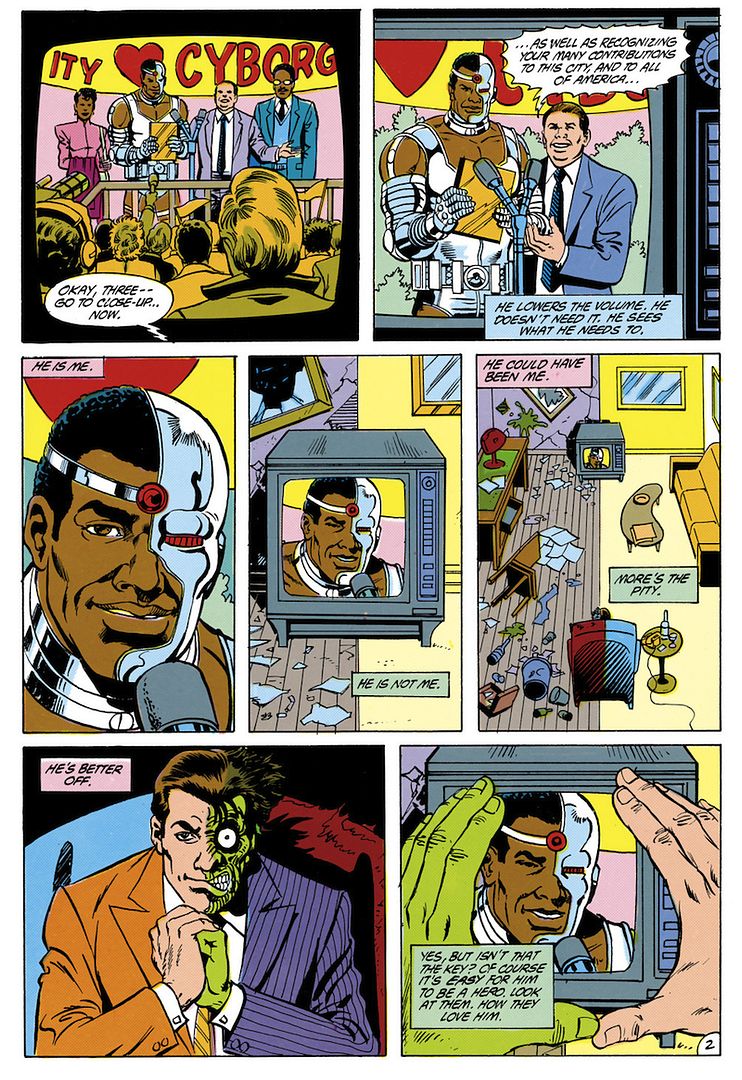
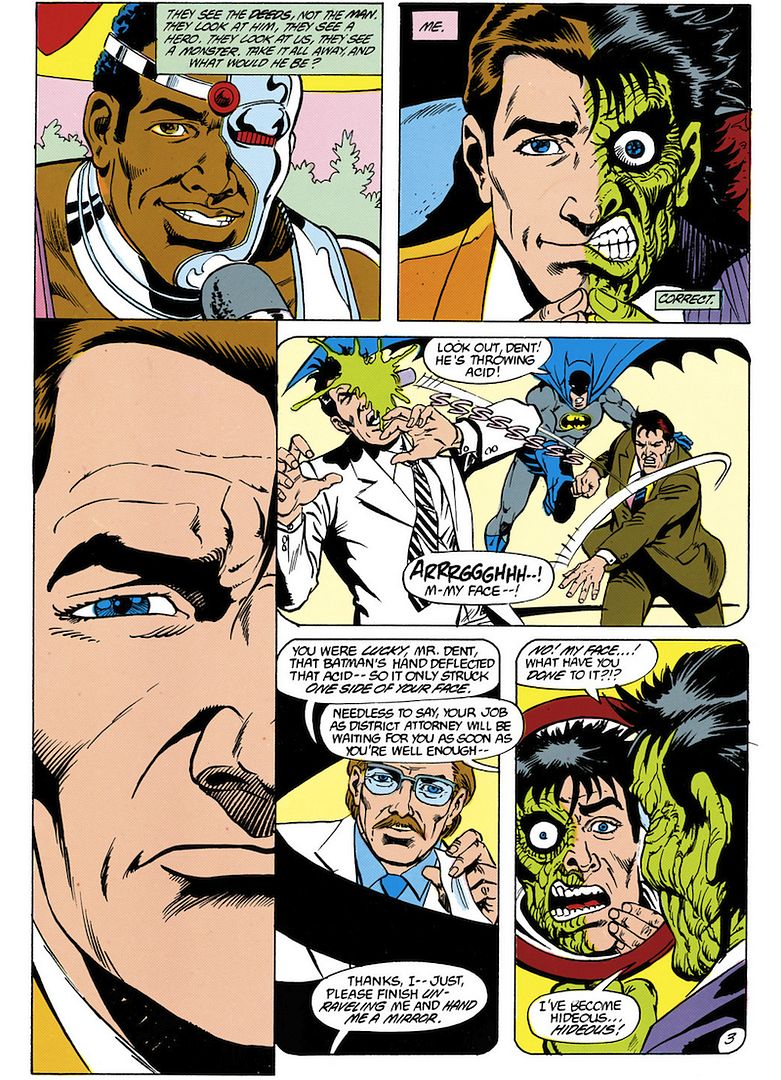
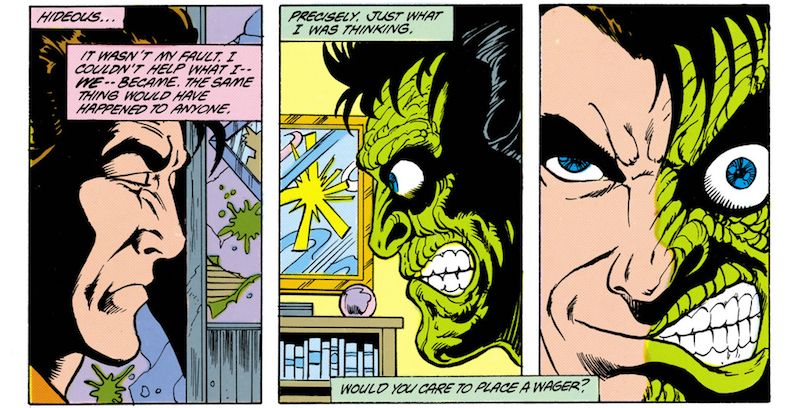
First of all, I think that this is the very first time that Two-Face has been depicted as having two separate voices in his head which can interact with one another. It's always been canon that Harvey has good and bad sides, but these were always shown by him fluctuating between moods rather than exhibiting signs of multiple personalities, at least how we usually see them in pop culture. In a small way, this is a radically different change that predicted--if not directly influenced--how Harvey's mental illness would be depicted from Eye of the Beholder onward. That said, as you can see here, the division between the personalities isn't the same deadlocked conflict of good and evil that we've everywhere else. No, it's more subtle and sinister than that.
For now, back to the story: Cyborg strikes up a flirtatious conversation with Cynthia Adams, the woman who organized the event, and after the two seem to be hitting it off nicely, she offers to treat him to dinner at "my place." Vic eagerly agrees, which is when we cut to (cue rimshot and/or sad trombone):

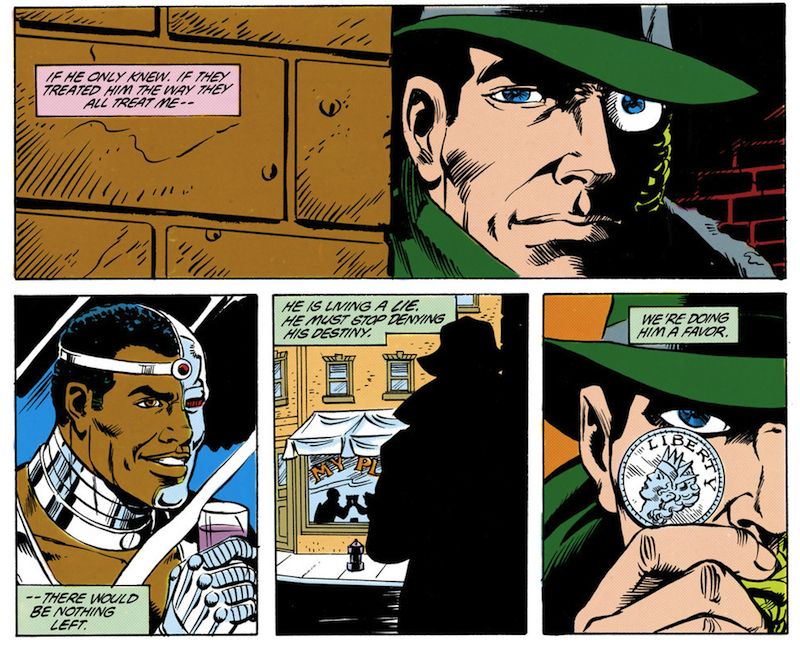
Knowing that he will have to hurt Cyborg but telling himself that Vic will thank him for it someday, Harvey flips the coin, and of course, it comes up scarred. If it didn't, we wouldn't have a story!
That's kind of the problem here: Harvey already set out to prove a point even before the scarred coin told him to act. What would have happened if it had come up clean? Would he have shrugged and gone home, end of story, leaving the oblivious Cyborg to his date? Would Harvey have carried out his "lesson" to Cyborg in a different, less cruel manner than the one he's about to enact? Or was this just a typical case of a writer having Two-Face act as they want without factoring in the coin as an influence? Probably the last one.
In any case, Vic and Cynthia's date ends platonically, and they part ways at her apartment. The hero walks away secure in the knowledge that he's accepted and respected as a worthwhile human being, oblivious to the man in the split hat and coat who slips into Cynthia's apartment behind him.
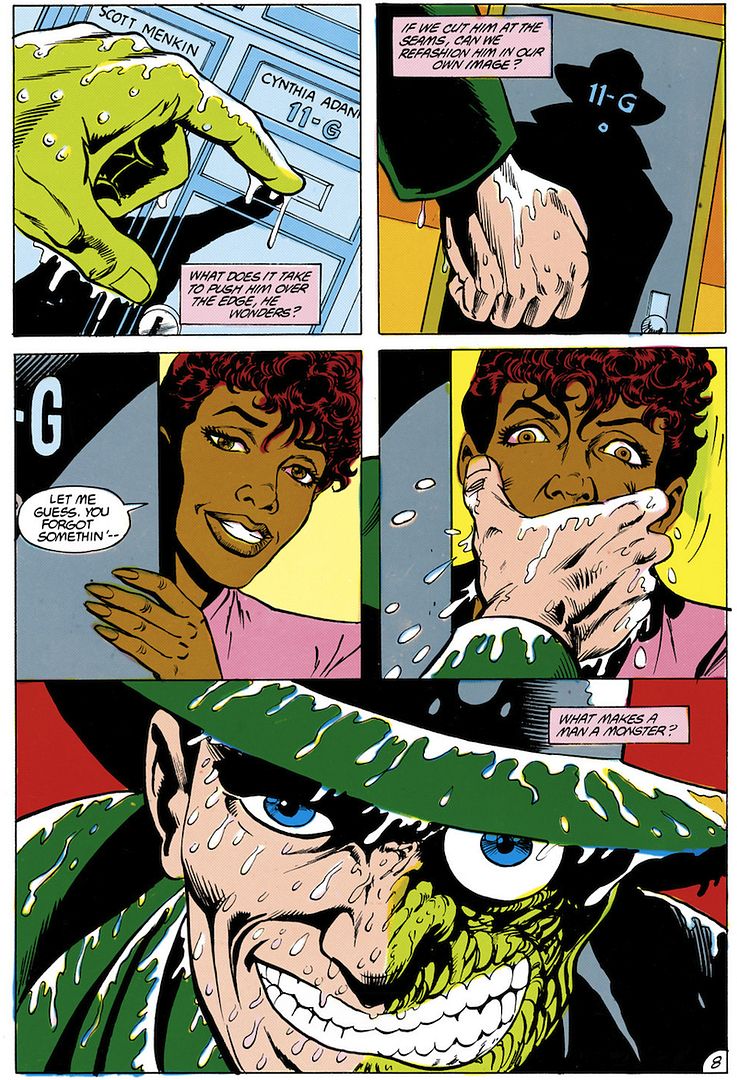
Man, I don't mind artists depicting Harvey's left hand as being scarred (I'd rather it be partially scarred to suggest that he grabbed his face as the acid burned, not scarred all over as if his whole body was dipped in acid), but it always annoys me when colorists take it upon themselves to pull shit like this. Two-Face isn't half-Hulk.
Later on, Vic is awakened in his own apartment by a phone call telling him to check outside his door. "I'd hurry if I were you." There, he finds an envelope with photos of a terrified Cynthia--tied up, crying, and with a gun to her head--along with a letter of instructions for Cyborg to follow if he wants to save her life. The letter warns him not to call the police or warn anybody, and that he'll be watched the entire way. His first order is to head to a nearby dumpster and put on the hat and coat he finds there, and to keep them on... or she dies. The letter adds, "It's for your own good."
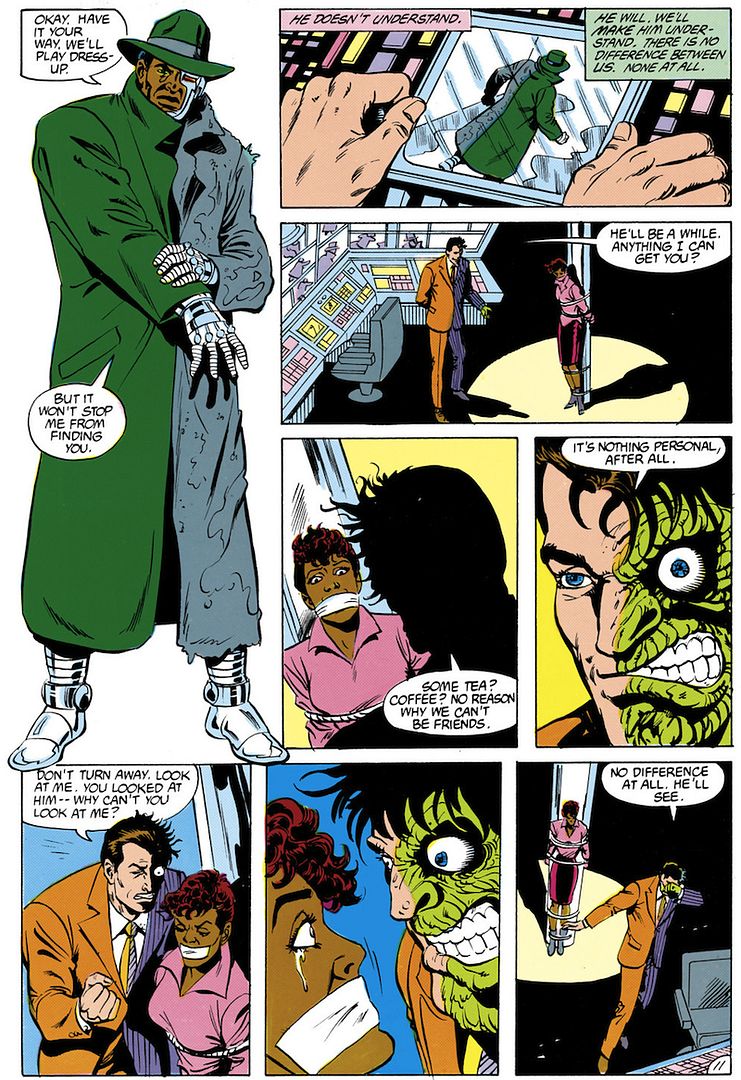
It's the complete lack of malice that makes this Two-Face so unsettling, far more so than if he were sneering and threatening the whole time. If this were the monstrous Two-Face we've so often seen, furiously demanding, "WHY WON'T YOU LOOK AT ME THE WAY YOU LOOKED AT HIM, HUH?! RARGH!" In the broken logic of his mind, there's no reason why she should be angry at him nor disgusted by his appearance. It's sad and creepy at the same time.
Harvey's note informs Vic that the next set of instructions are hidden throughout the city, each one containing the location of the next, the last of which will give the location of Cynthia. The first note Cyborg must retrieve is located inside inside an apartment, which means that Cyborg has to do a little breaking and entering, hopefully without drawing too much attention. "I'd ask you not to disturb the neighbors," Harvey's note says, "but you're not quite as good at this as I am. Not yet." It looks as though Cyborg will be able to sneak in and out undetected when, as if on cue--and perhaps that's what it was--the sleeping tenant's alarm goes off, waking her up to see her intruder.
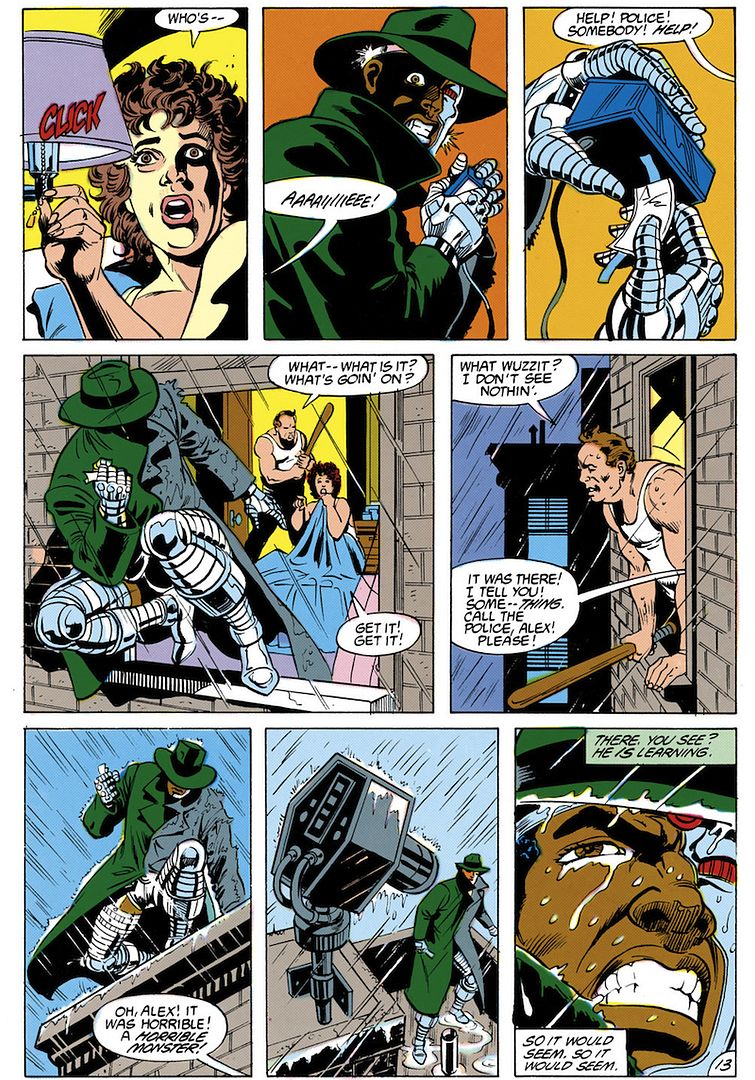
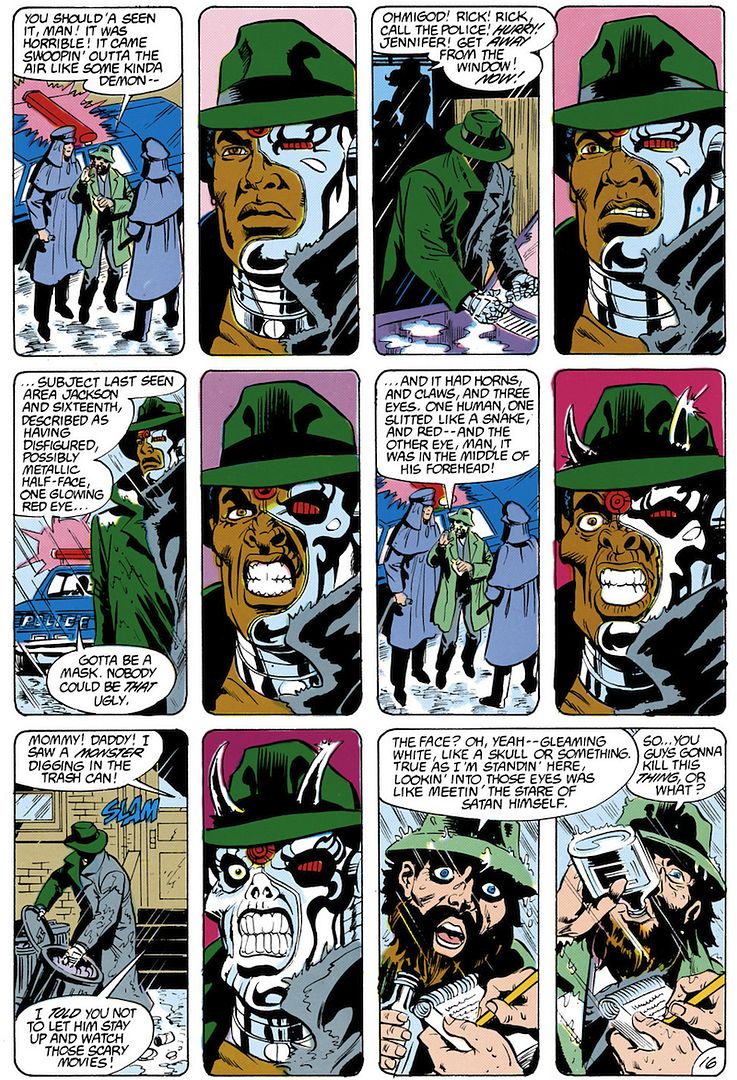
The bitterly ironic thing about what Harvey's doing here is that he's taking a page from Batman's book and using it against Cyborg, forcing the hero to stay hidden just enough so as to play upon the superstitious and cowardly populace. It's never stated in this story that Harvey was inspired by Batman, but considering that this is Gotham City, it's a wonderful suggestion for us to take or leave as we see fit. The next note leads a bitter, tormented Vic Stone to the one place in Gotham where he can have this reversal of affection shoved right in his half-metal face. This allows JMS to indulge in a bit of Serling-esque third person narration, giving this story's tone a Twilight Zone edge for a good man having a very bad day.
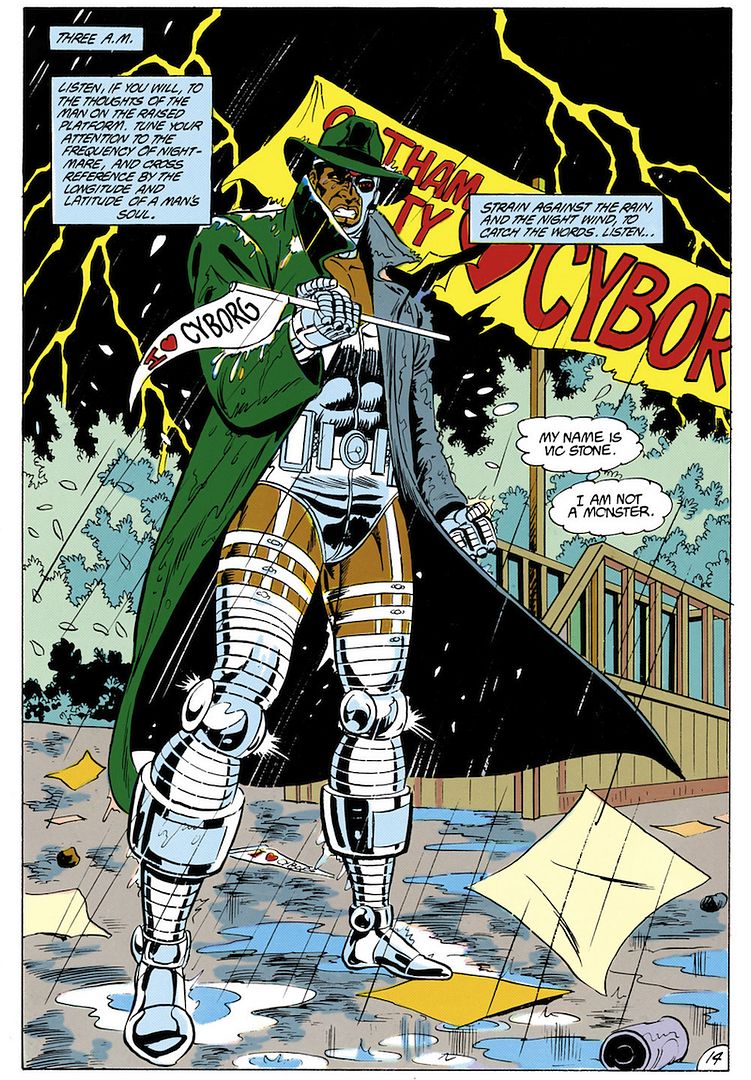
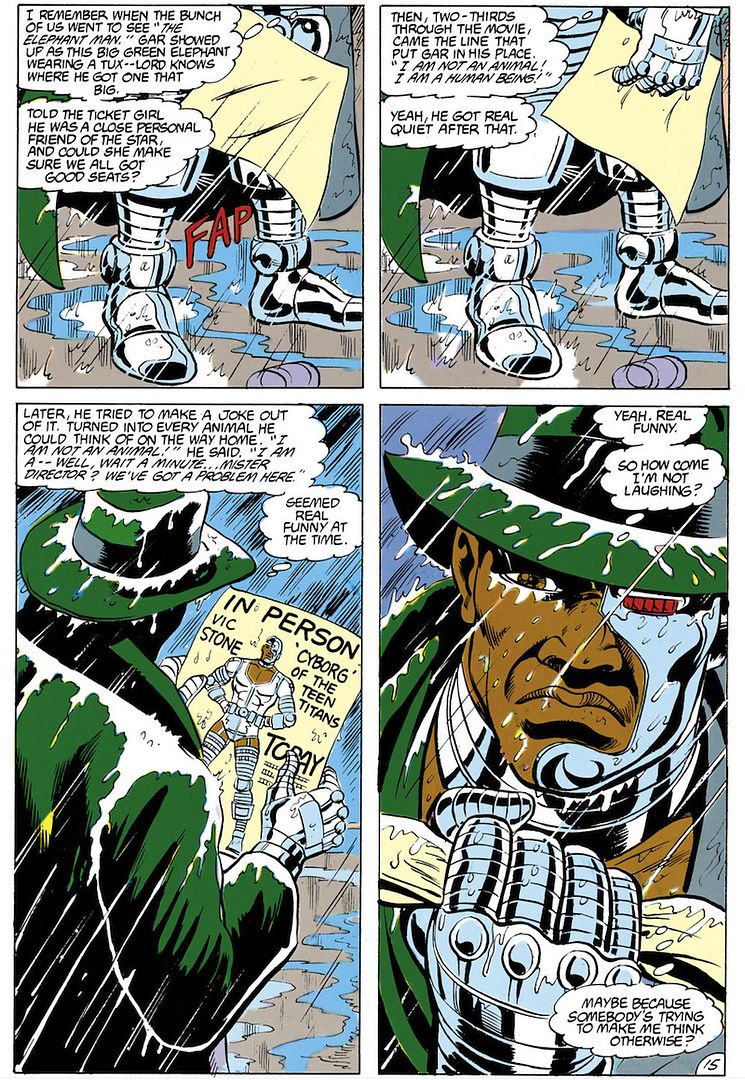
The recollection with Beast Boy ("Changeling" at this point, but c'mon, he'll always be Beast Boy) seeing The Elephant Man is a nice touch. That said, when it comes to the idea of Teen Titans going to see David Lynch movies, I have to wonder what their reactions would have been if they went to see Blue Velvet or Eraserhead instead.
Vic finds the next note underneath the tattered "GOTHAM CITY HEARTS CYBORG" banner and heads off to find the next one as the surveillance cameras continue to follow his every move. Man, Harvey was REALLY busy in the space of just a few hours, wasn't he?
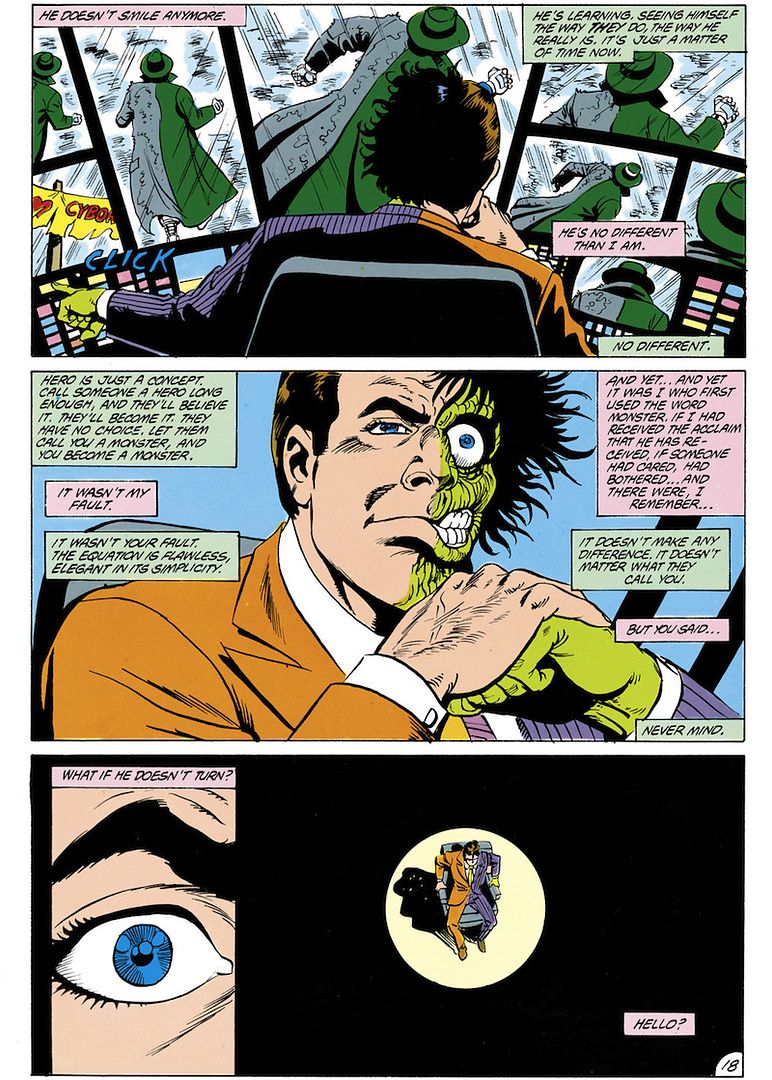
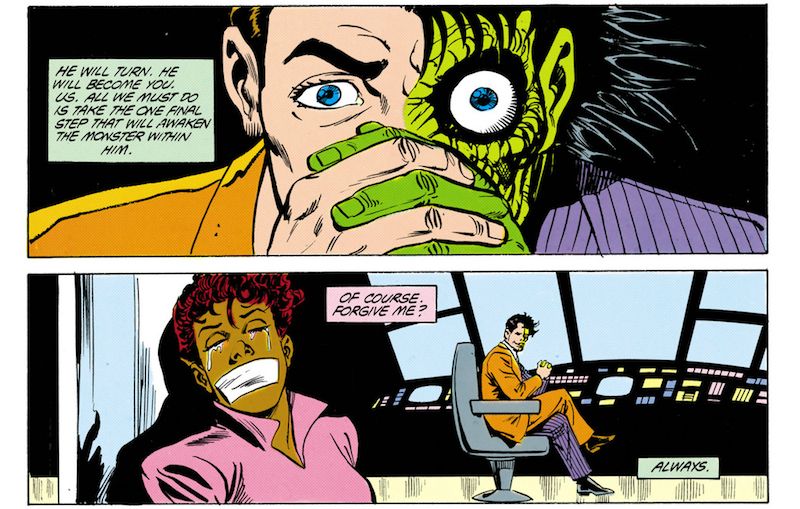
As noted earlier, the two voices in Harvey's head aren't divided between the usual deadlocked conflict of "noble, tormented Harvey Dent" and "evil, monstrous Two-Face." You can't even tell which side is the good one and which is the bad, although the green caption box seems to be more actively, subtly manipulating the pink one. If any could be considered the good one, it's the pink one, with the green one being the controlling manipulator. After all, it was the one that proposed the "wager" that set this entire scheme into motion. And it's the one that steers Harvey back into focusing on the plan after he's hit with terrifying, crippling doubt.
Even still, it's hard to really consider the green box as Harvey's bad side, per se. Much like the classic version of Two-Face, they're just two sides of the same single voice having a back-and-forth conversation. It's just a step removed from the kind of internal dialogue that most normal people have from time to time, sometimes manifesting when someone's trying to convince themselves of something. If the green voice is Harvey's evil side, then his horror at its absence in the face of "What if he doesn't turn? ... Hello?" is telling. Without that voice, Harvey might be forced to face the truth about himself. He's his own enabler.
Vic goes off to find the final note, which is hidden inside a bank. He tries to break in stealthily, but Harvey--wanting to put another nail in Vic's coffin--tips off the cops, who think they've found the monster that everybody's been talking about. They open fire on Cyborg, and in his rage, he almost blows them all away. In his horror, he stops himself and escapes, turning his fury back on whoever's pulling the strings. He follows the final clue to its location, ready to meet his enemy face to face. To face to face. Ah, that's where the title comes in, I see.
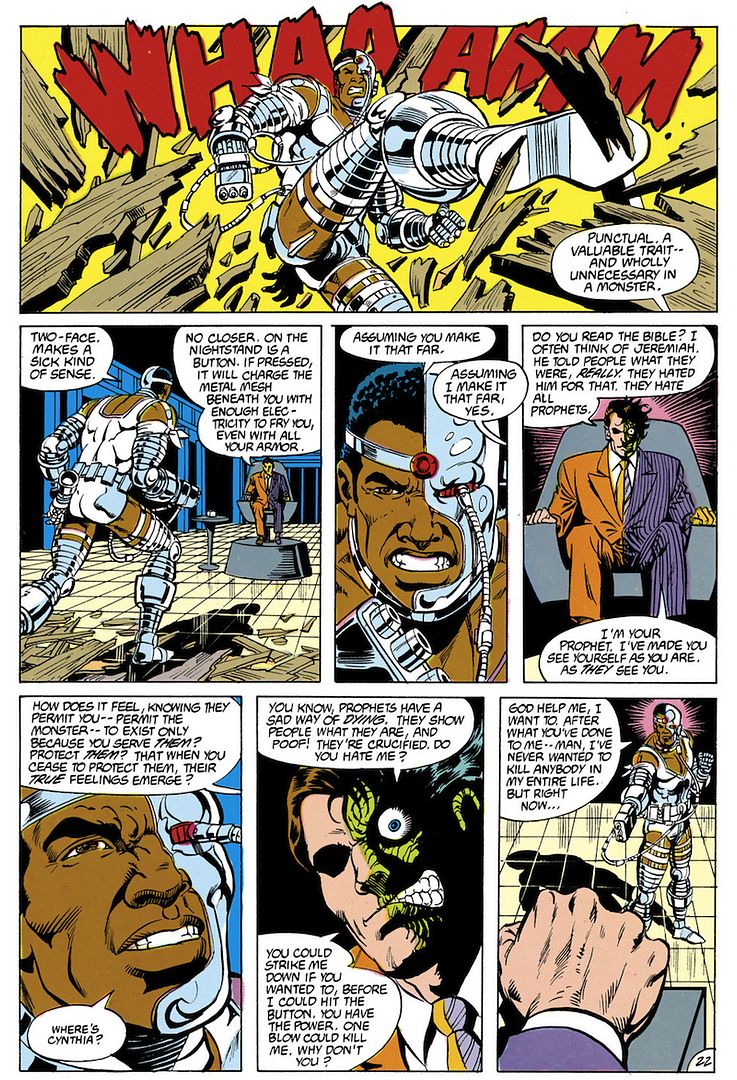
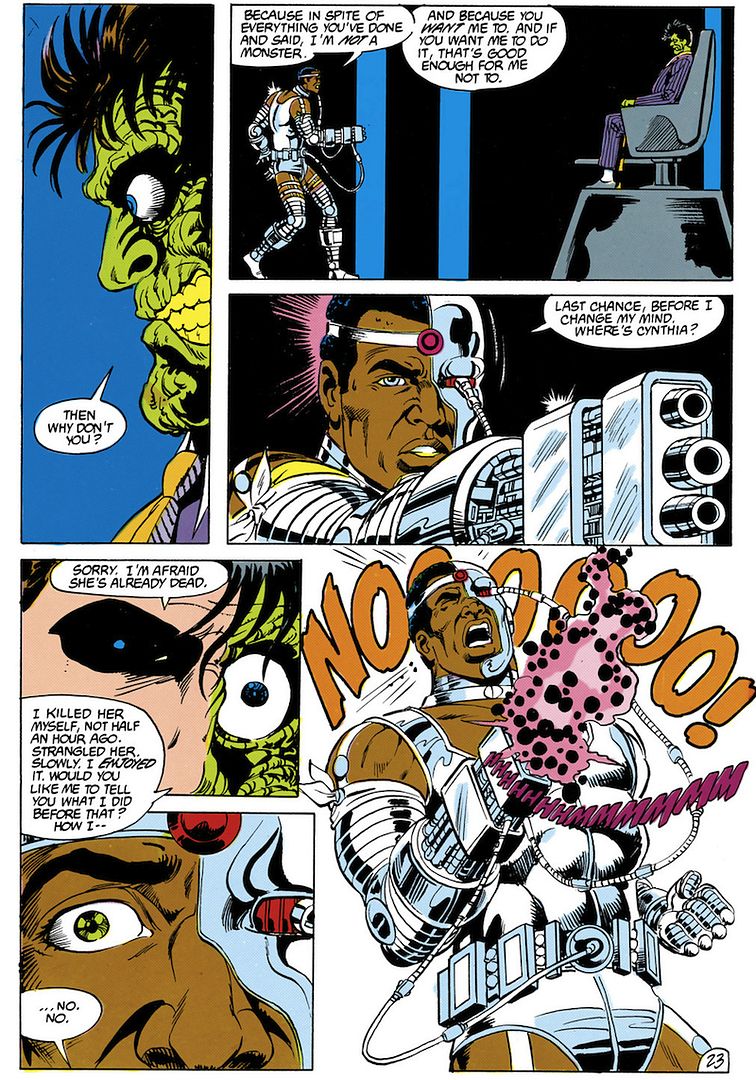
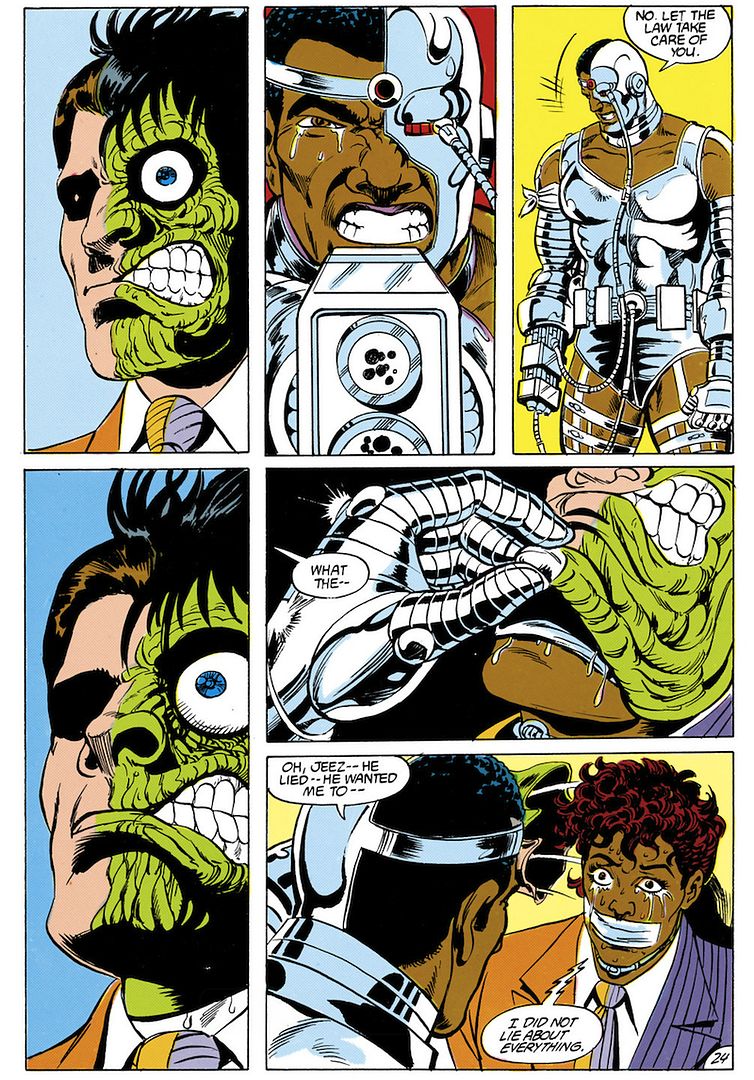
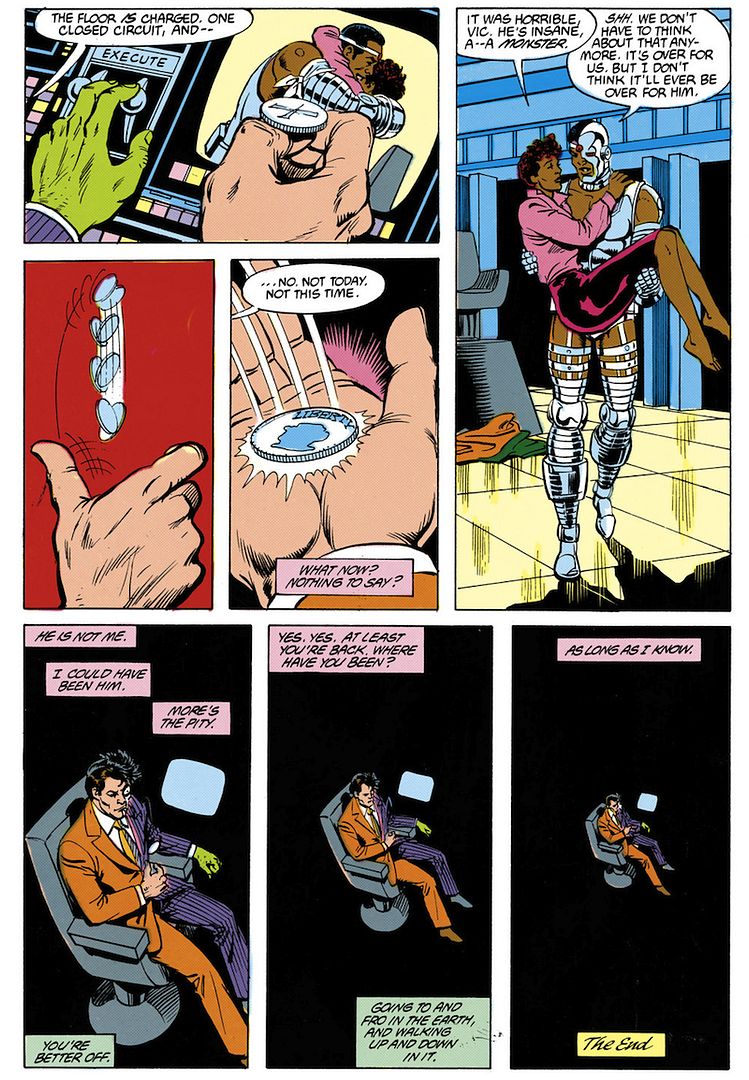
"But I don't think it'll ever be over for him." With that line, it's implied that Vic has some empathy with what Harvey is going through, knowing that there's little chance of reprisal from his own torment. While that may be true, Harvey at least isn't in the same place he was at the start of this story. He's been forced to confront himself, to see that it was at least partially his own choice to become what he became. I say "partially" because, unlike Vic, Harvey is clearly mentally ill, and that voice has been the one manipulating him all along, just as it shall continue to do so. Even after Harvey reaches the epiphany about himself, the green voice assures him, "You're better off." And thus the tragic cycle of enabling continues for Harvey Dent.
One last note about that line: "Going to and fro in the Earth, and walking up and down in it." This is a Bible quote, one which JMS enjoyed so fondly that he recycled it later in a story for the Sci-Fi Channel's short-lived audio drama channel, Seeing Ear Theatre, as well as an episode of the Babylon 5 spin-off, Crusade. The full passage is:
"And the Lord said to Satan, 'From whence comest thou?' And Satan answered the Lord, and said, 'From going to and fro in the earth, and from walking up and down in it.'
Putting aside the obvious implication that Harvey's bad side is the metaphorical (or even literal) Devil on his shoulder, the very best of this quote is its source: it's Job 2:2. Well played, JMS, well played.
If you'd like to buy this issue, you can either track down the back issue of Teen Titans Spotlight #13 online, or you can buy the remastered version digitally at Comixology for just 99¢!